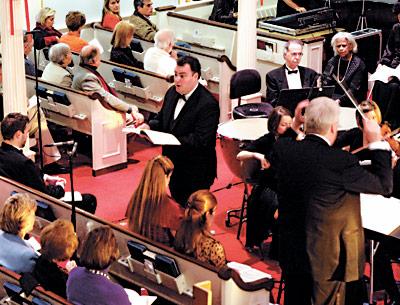‘The Messiah,’ Fresh and Exciting

Some community choruses would appear to perform “The Messiah” practically every Christmas. It is a linchpin of the choral repertoire, it’s in English, and it tells the story of Christmas in a compelling way. Yet performing it so frequently turns the piece into something of a ritual for singers and audiences alike, and we should be grateful that our local Choral Society of the Hamptons sponsors more diverse programming. How much better to pull “The Messiah” out only occasionally, so that in hearing it again we are actually surprised by its greatness.
Is there another piece of music in the classical canon that begins as stunningly as Handel’s “Messiah”? On Sunday afternoon, the Choral Society of the Hamptons had me thinking no. First comes the sublime recitative “Comfort Ye,” followed by the vocal flourishes of the aria “Ev’ry Valley,” both delivered here with poise by the tenor soloist, Nils Neubert. Then the chorus enters strongly with “And the Glory of the Lord,” quickly rising to full volume, and completing a trio of pieces showing unparalleled beauty, energy, and power.
The chorus was well prepared and delivered Handel’s many intricate passages gracefully and crisply — no mean feat. Its director, Mark Mangini, also brought out nicely layered dynamics in the voices. “For Unto Us a Child Is Born” was especially good, with changing dynamic shapes giving pleasing variety to the repetitions in the music. The rich tone of the baritone soloist, Mischa Bouvier, on “The People That Walked in Darkness” matched well with the striking, sinuous melody. The mezzo-soprano Suzanne Schwing and soprano Rada Hastings’s duet on “He Shall Feed His Flock” was a true highlight, particularly Ms. Hastings’s voice on Handel’s achingly beautiful melody to the text “Come unto him, all ye that labor and are heavy laden, and he shall give you rest.”
The chorus was accompanied by the South Fork Chamber Ensemble, which showed forth admirably on the instrumental movements, especially the “Pifa,” Handel’s musical introduction of the shepherd’s abiding in the field. Also nice were the light string passages in the aria “But who may abide the day of his coming?” If space constraints were not a factor, additional strings might have solved minor intonation problems that afflicted the small ensemble at times.
“The Messiah” is composed in multiple sections. While the chorus performed primarily Part One, or the Christmas portion of the piece, some movements from Part Two were interpolated in. The near ubiquitous “Hallelujah” chorus, as Mr. Mangini pointed out in his program notes, is actually from Part Two, the section that pertains to Easter. However, he also allowed that you can’t really leave it out of any performance of the piece, and so we were treated to it. And, perhaps because it’s been a while since the Choral Society performed “The Messiah,” initially very few audience members remembered to rise for the “Hallelujah.” Slowly, people caught on and got to their feet. That so many had forgotten this age-old custom I took as a good sign: this “Messiah” was no ritual, but rather a fresh and excited performance of a masterpiece.
